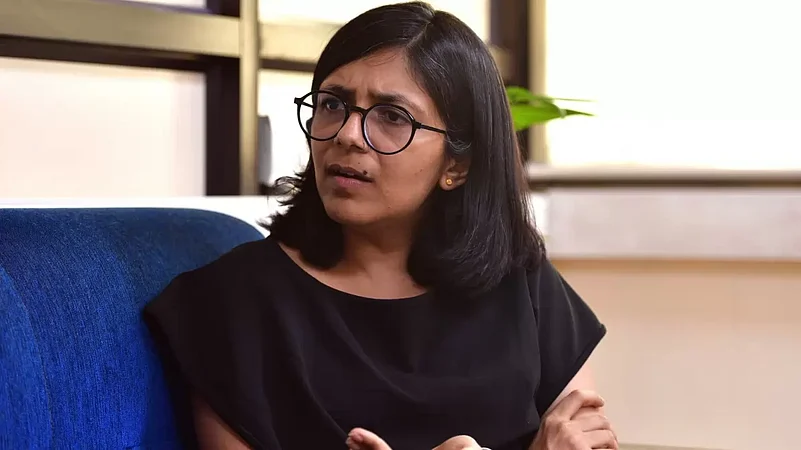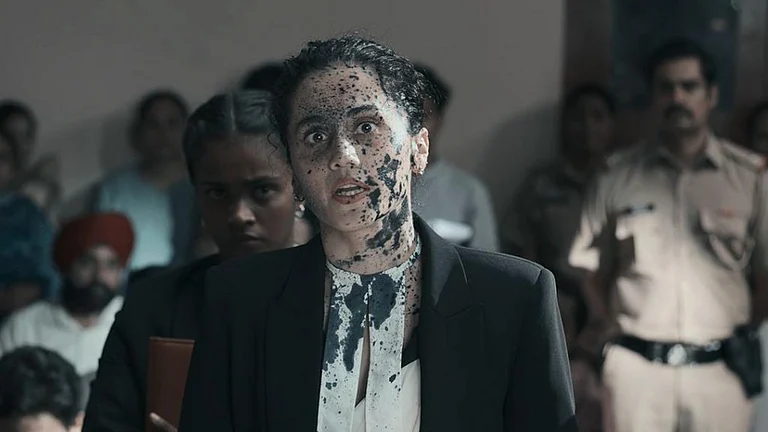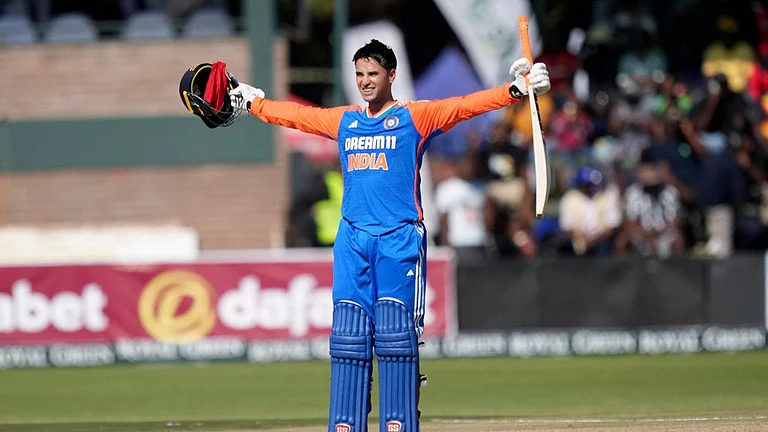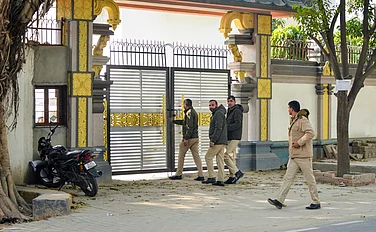Women’s rights activist Swati Maliwal took over the reins of the Delhi Commission For Women (DCW) in July 2015. Since then, the DCW chief claims that the organisation has dealt with over a hundred thousand cases involving women facing gender-based violence, abuse or discrimination. Her tenure has witnessed a national rise in sexual violence against women. The last two decades have seen India’s rape-related crime rate rise by 70.7 per cent (from 11.6 per 100,000 cases in 2001 to 19.8 in 2018) as per a 2022 report by the Public Health Foundation of India. In 2022, Delhi recorded a steep 17 per cent rise in crimes against women in the first six and a half months of the year as compared to the same period in 2021. The data by Delhi Police also showed that an average of six cases of rape and eight cases of assault on women were reported daily in the capital.
The last year has also seen an increasing number of partner violence cases ending in murder or assault across the nation. The recent hacking of a 16-year-old girl in the Shahbad Dairy area of Delhi by an alleged suitor, the murder of a student in Greater Noida’s prestigious Shiv Nadar University by her jilted lover (who later killed himself), the gruesome Shraddha Walker murder case where the victim's body was cut up and strewn across parts of the capital by her abusive live-in partner, and several other such cases highlight a systemic failure on part of the nation in ensuring women’s right to life and safety.
In the backdrop of such cases and the ongoing debate regarding sexual harassment in the workplace highlighted by the wrestlers’ protests, DCW chief Swati Maliwal who recently sought capital punishment in the Shahbad Dairy case, speaks about the “culture of impunity”, the politicisation of the gender-based violence, systemic apathy and misogynistic shaming of women that ensures the perpetuation of violence and highlights the failure of the legal machinery to protect women.
Edited Excerpts:
Do you think that gender-based violence has been on the rise in India? Why do you think this is happening, despite harsh laws against sexual and other forms of gender-based violence?
There is definitely an increase in gender-based violence and there are no two ways about it. But what is striking is the increasing incidence of brutality with which these crimes are being carried out. This is one thing that has been visibly increasing over the years. An eight-month-old baby was brutally raped. She had to undergo three operations. After that, an 80-year-old woman was raped. So the kind of brutality, the murders that are happening, and the sheer number and variety of cases, be it cyberbullying, stalking, or acid attacks, all point to increasing intensity, brutality and volume of crimes against women.
And the biggest reason for it is the slow and often inept justice system in place in India. There are laws, yes, but there is hardly any deterrence. People are not scared in the country, they think they can commit any kind of crime and get away with it without any consequences. Take the Chawla incident. A 19-year-old girl is brutally gang-raped and murdered, acid is poured into her eyes, and her genitals are mutilated with alcohol bottles. And yet, the culprits are able to walk away after 10 years. Why? Because the Supreme Court observed that the Delhi Police had done a very shoddy investigation.
This isn’t about an isolated example of police inefficiency, it’s a systemic support for perpetrators of crimes against women. Look at the case of Bilkis Bano or Ram Rahim getting parole every now and then. And now the wrestler’s protest where you can see how blatantly the Delhi Police is supporting and protecting the accused. It is such an open-and-shut case.
Even if in such blatant cases, criminals are allowed to walk free, or in fact are supported by the government and law machinery, what is the message to society? The message is that no matter what crime you do against women, there is a section of powerful people who are willing to protect you.
What will ensure a change in society’s attitude toward gender-based violence?
I feel that until there is certainty and swiftness of punishments for crimes, people are not going to be scared. At the women’s commission, we speak to so many survivors. Six rape cases are reported every day in the capital. That’s such a huge number but these are just cases that are being reported, it’s just the tip of the iceberg. Girls are facing all kinds of abuse and they are unable to even report it because when they do, nothing happens.
Once a girl reports a case, it’s just a horror story for her. First, a girl is raped by a man, then she is raped by the entire system. And I say this with full responsibility. Few girls can muster the kind of courage to report.
You are saying that violence against women is institutionally supported in India?
Yes. Patriarchy is very rooted in our society as well as in our systems. And, there is a culture of misogyny that already existed and is being constantly fed by the image of powerful men getting away with crimes against women. This creates impunity for criminals.
When it comes to the system, in order to ensure deterrence, you need to have certainty and swiftness of punishment. How do you ensure that? You ensure that through strong laws, greater accountability of the police force, greater resources to police, a larger number of fast track courts, and better forensics.
Now look at each one of these metrics and see how we fare.
Is the police responsible for enforcing deterrence alone?
There are two points here - lack of resources in law enforcement and lack of political will.
In 2002, Delhi Police requested 66,000 additional personnel from the Government of India because there has been a dire shortage of officers. To date, they have only got 3,000 and that also happened only after I sat on a hunger strike for 13 days in support of the police’s demand among other things.
Imagine, that in almost 20 years, only 3,000 police personnel have been increased. You visit any police station in Delhi, the police are functioning at half their sanctioned strength. Even the ones that are there are busy providing security to VIPs, or managing dharnas and protests, all of which come under-enforcement of law and order. There are hardly any investigation teams or even a separation between law and order teams or criminal investigation teams. There is a complete dearth of resources.
At the same time, there is hardly any accountability that is being fixed. If you look at this wrestler’s case, for six long days, Delhi Police failed to register an FIR in the case of a minor survivor of sexual assault. That is completely illegal. I mean there is absolutely no doubt about the illegality of such an act on behalf of the police. And yet, they were able to get away with it. The survivors had to approach the Supreme Court and it was only after the apex court’s intervention that the FIR was filed. Now who will hold the Delhi Police accountable? Why is it that no accountability is set?
Since the time I have become Chairperson of the DCW, I have repeatedly requested the government of India to set up a committee which should be chaired by the union home minister (since the Delhi Police reports to him) and that committee should hand the LG, the Chief Minister, the Police Commissioner and they should meet with the DCW. Every day, the DCW’s 181 helpline for women receives anywhere between 2000-4000 calls of complaints. We are sending our girls left, right, here, there, everywhere. And so many women and girls are complaining on a daily basis.
On a daily basis, 400-500 survivors of sexual violence are actually coming to us with complaints. Now it’s such a scenario that if all the authorities involved do not sit together and have a discussion in a coordinated manner, work out their respective roles and be accountable at least to each other, how will women get justice? You see, when Anjali’s case happened, was a meeting called? No. When Shraddha Walker case happened? No. When the eight-month-old baby was raped. Was a meeting called? No. Forget about that, in the past eight years of my tenure as Chief of DCW, has such a meeting been called? No. So How do you ensure that action is taken, if there is absolutely no talk or coordination with all the authorities responsible? Because the Centre is responsible for the Delhi Police. But there is a lot of work that the Delhi govt also has a lot of work to do. So the state government’s accountability, the centre’s accountability, all of it needs to be checked in a systematic, coordinated manner. Otherwise, it’s the same drill every time an incident takes place. There is rape, there is a lot of furore, there are protests and even a lot of politics around it. But that’s it. There is no action or solution.
What about other forms of gender-based violence like stalking, mental harassment, and domestic violence? Do they get equal importance from law enforcement or the legal justice system? Is the system addressing such cases at the right time?
I don’t think the system is addressing these cases at the right time. The most important aspect of gender-based violence is the domestic violence cases. In the past six years, the DCW has handled over a100 thousand cases and 70 per cent of these cases have been domestic violence issues. Intimate partner violence is such a persistent and omnipresent problem and can lead to the death of victims when unaddressed. The brutality and brazenness of the murders, whether it is the Shiv Nadar case or the murder of the 16-year-old girl in Shahbad Dairy, reveals the apathy of society when it comes to gender violence. In the Shiv Nadar case, college authorities seemingly allowed violence against the girl on campus for days and it culminated in the murder-suicide of both boy and girl involved. In the Shahbad dairy case, the girl was mercilessly hacked to pieces in front of multiple pedestrians. People saw, some even filmed the incident and there were some who just looked at her and looked away without even batting an eyelid. Not a single person came forward to help. What kind of a cold-blooded society have we turned into?
Elaborating on the campus violence incidents, be it the Shiv Nadar case or the recent IP College sexual harassment fiasco in DU, do you think educational institutions need to also be held accountable for women’s safety, at least within premises? And how?
I think that a very strong implementation of all guidelines and laws is the need of the hour. In the IP college case, only after Delhi Commission issued a notice to the police that an FIR was registered. Only after we got into the picture that some people were apprehended. And we had to give a five-page report to the Delhi Police and DU which stated a complete lapse on both their parts in ensuring the safety of women students, in preventing the incident or in ensuring speedy justice. There is so much apathy. We have interacted with the IP College principal, and senior officials from Delhi University but there is this complete apathy in the system when it comes to believing in the survivors or victims. This tendency to victimise shame is so widespread. The attitude is like, “Oh, women they just make these exaggerated claims, it wasn’t that big a deal, it was just a bit of shoving not assault”. I myself have faced such scrutiny when I myself complained of sexual harassment recently. And I am the women’s commission chief!
This just shows that there is a complete lack of understanding of what sexual harassment even means. And what kind of trauma it can lead to. This mindset is prevalent in educational institutions as well. A prime example of the misogyny of educational institutions is perhaps in their 7-8 pm guideline deadline for girl students to return to hostels while boys are allowed to stay out till 12 pm. The DCW has taken the matters up various times with education institutions and the matter is pending before the Delhi High Court.
But these cases, be it Shiv Nadar or IP College, Chandigarh University case where these boys were filming videos of girls without consent. The only reason is to see behind them is the complete lack of implementation of sexual harassment at workplace laws in these educational institutions. Then there is a complete lack of training of staff and ICC members.
It’s also important to note that once an incident happens, there is an attitude of hushing it up. There is this attitude of telling the survivor that “nothing happened, this wasn’t a big deal”. And that entire patriarchal mindset only points fingers at the survivors while asserting that it must be her fault. These are the very attitudes that get amplified within educational institutions as well.
To explain, I want to share a very weird experience recently when I was on a podcast with an educational institution’s head. I had agreed to it thinking that an educational institution’s head would perhaps talk about feminism. But when she was asked to describe what the word ‘feminism’ meant to her, she said it was a “distraction”. This was literally a podcast organised on feminism in which she kept saying that her institution did lots of training and counselling to ensure that the girl students are protected. But how do you protect girls when your own attitude toward feminism is so skewed?
And what about the youth? We are seeing that several of the recent gender-based crimes that were highlighted in media have been by a certain age band that we understand as youth or young adults, people in their teens and twenties. Do you think that there has been an increase in a certain kind of aggression among youth today? What might be driving such a shift, if so?
I feel that be it in Delhi or the rest of the country, the prevalence of illegal alcohol, drugs and even weapons in urban slums and industrial areas has increased tremendously. It is so easily available to everybody, including minors.
Second, while technology and educational awareness has advanced for the better, it has given minors and youth a lot of access to content with sex, violence and mature themes. There is absolutely no system by the government to regulate the dissemination of such content. Youth today are exposed to sex, the idea of sex, and the physical and online acts of sex. But they are not exposed to sex education which includes the concept of consent, harm and preference. That’s because even now, there is no concept of sex education.
As we can see in many cases of gender violence, it’s by an aggrieved partner who thought he has a certain claim on a woman and when she rejects his advances, he attacks. Because these people have no idea what women’s agency means in a sexual or intimate relationship. The requisite steps that have to be taken by NCERT, by government are missing.
Does lack of sex education play a role in gender-based violence?
I’ll give you an example. We were going through NCERT coursework and we will soon be submitting a report to the body with recommendations on what they don’t cover. The books don’t even talk about the myths and taboos around menstruation. How it shows up as violence? Recently, a 12-year-old girl in Maharashtra was killed by her elder brother after she started menstruating for the first time. He killed her because she thought he is having an affair. This man clearly knows about sex but has no idea how a woman’s body works, despite being several years older. So at the end of the day, there are no studies that as such show that children have become more aggressive. But of course, increasing technology and exposure to tv and film content mean children are much more exposed today to adult themes and content without the right training needed to deal with these concepts. Why is it that technology cannot be used for the good by the government and why does govt not focus on better digital literacy and sex education - just talking about topics like sex — if you look at the books — they have not changed. There is just one topic on reproduction. It has nothing about the bodies, nothing about good touch bad touch. POCSO is a law that is actually about children. But it has not entered the children’s educational curriculum. Most children don’t know about it or their own rights. Today a child is exposed to sex much earlier than before, and is probably even arriving at puberty much earlier, then why is there absolutely no talk about it? There is no conversation, debate, or discussion about sex at home or at educational institutions. Whatever they are learning about sex and relationships is in a manner that’s very detrimental to their long-term sexual health, for their own understanding of their own body and sexuality, and the impact of this is the worst on women and LGBTQIA.
There is so much gender stereotyping in the way we talk, so much body shaming, and colourism, even in the most educated of people. All of it feeds into the culture of misogyny. And it’s even worse for the LGBTQIA community which faces the worst of the discrimination and abuse, be it mental, physical or sexual. Why is it that despite children growing up with such exposure, the government fails to keep up with the pace?
You have recently sought the death penalty in the Shahbad dairy case. As you said, despite our laws being strict, they are not currently acting as a deterrent. In this scenario, does seeking a death penalty make sense, especially when we see that many of the foundational aspects of ensuring gender safety are not yet covered? Also, research shows that the death penalty does not act as a deterrent for sexual or gender-based crimes. So what is the rationale?
You see I had sat on a hunger strike in 2018 after the rape of this 8-month-old girl. We had to get her operated thrice. And my hunger strike lasted for 10 days and my demands were met on the 10th day by the government and an ordinance was passed which accorded the death penalty to rapists of children in the rarest of rare cases within six months. I got up thinking that I had managed to implement a change. But within one and a half years, I was sitting for yet another hunger strike because nothing changed. I again had to demand the death penalty, at least in some exemplary cases.
I met the family of the 16-year-old victim, the poorest of the poor, living in the worst imaginable conditions. This family does not even have their own toilet. Father was a daily wager. The girl was very smart and ambitious. While in class 10 herself, she was giving tuition classes. And she was trying to support her family. She was killed in one of the most brutal ways. The mother told me just two things. Heartbroken and grieving, she said that if only the people around her at that time had so much as screamed, her daughter may have been saved. I completely agree.
The other thing she said was that the perpetrator should be given the death penalty. That was what she told me and I just reiterated that. Because you see, I agree that until there is certainty and swiftness of punishment in each and every case, there is no solution to gender-based violence. Of course, I’m not saying one should become the Taliban and give capital punishment for every crime. But there has to be a process of justice, same result. Even that eight-month-old baby’s rape case has not yet been dealt with and is still in court. It’s still continuing. Probably when she will be 16, she will be narrating something that she has no memory of.
But that’s also the thing. Stricter punishments take longer to come. Several lawyers fighting sexual violence cases in courts state that because the punishment for sexual violence is strict, conviction rates are low. Does that not further hinder the process of getting justice?
At the end of the day, what does the law say? It says that if the judge so believes that this is one of the rarest of the rare cases, the death penalty CAN be accorded. Not that it SHALL be accorded. So there is a range of punishments that can be given. But in certain cases, especially in a country like ours where people feel so emboldened, where they are able to get away with crimes, how do you send a message? You do so by giving exemplary punishment to certain people. We keep saying that the “death penalty” is common now but where is the death penalty actually happening? Yes, it’s announced, and it makes it to the headlines. But it rarely happens. No one is getting punished. Conviction rates are at an all-time low. So I agree with that aspect of your argument that it is better that in each and every case, action happens, no matter what. I agree. But I also feel that in certain cases where brutality is beyond humanity, punishment must also be exemplary. For such cases, the strongest punishment needs to be given because that is the message that has to be given to the country. That if you do something wrong, this wrong, nobody can spare you. Maybe 25-30 years from now, if we have the political will to bring about a change, there might come a time when we won’t need to call for exemplary punishments. But as the cases hitting the newspapers show, we are not ready for it yet.
I come from a very liberal thought process. But when you see the pain of victims, you cannot help it. As the Women's Commission chair, I stand by the victim. If that means seeking the death penalty time and again, I will have to keep doing so.


























